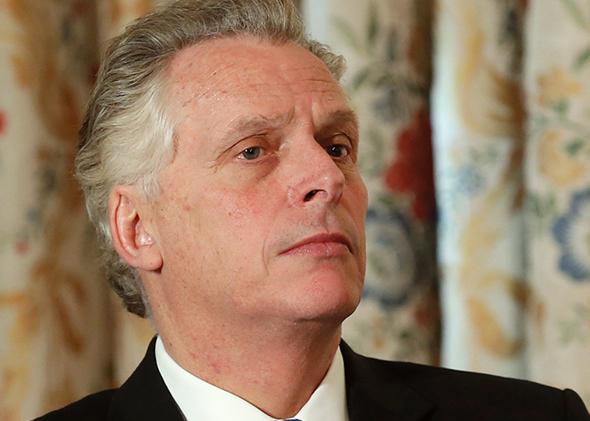Is Gov. Terry McAuliffe poised to blow up Virginia politics?
It’s a fair question given Friday’s Washington Post story on the governor’s potential attempt to expand the state’s Medicaid program without legislative authorization.
As the Post reports, “McAuliffe and his top advisers have consulted lawyers, health-care experts and legislators on how to bypass the GOP-dominated House of Delegates,” which refuses to adopt an expansion that would give health care to more than 400,000 low-income Virginians.
Medicaid was the centerpiece of McAuliffe’s campaign, and in his inauguration speech, he promised to press forward the policy, telling a rain-soaked Richmond crowd that he “will work with the legislature to build on the Medicaid reforms that the General Assembly has already achieved, and to put Virginians’ own tax dollars to work keeping families healthy and creating jobs here in the Commonwealth.”
After three months of constant meetings with Republican lawmakers, this push to implement the expansion has slowed to a standstill. McAuliffe won’t sign a budget without the change to Medicaid, and Republicans refuse to concede, citing cost (“it’s too expensive”), skepticism (“the federal government won’t cover its share”), and the political benefits of unified opposition—“This has been the No. 1 unifier,” said one Republican activist. In other words, McAuliffe’s willingness to lead means nothing when met with a rigid and hostile opposition.
Now, it’s worth noting the extent to which the Medicaid expansion is a remarkably good deal for state governments. Under the law, the federal government will pick up three years of full costs for any state that expands Medicaid to cover everyone below 133 percent of the federal poverty line ($15,521 for an individual or $31,721 for a family of four). After that, the federal subsidy gradually drops to 90 percent of the cost, with states responsible for the rest. A better deal than the current 50–50 split between states and the federal government for current Medicaid recipients.
For some opponents of the expansion, that still isn’t enough. Which is why it’s good news that, according to new estimates from the Congressional Budget Office, the burden for states is lower than expected. On average, notes the CBO, the federal government covers more than 95 percent of the cost of the Medicaid expansion. Indeed, states that take the expansion will spend just 1.6 percent more on Medicaid than they would otherwise. In other words, it’s not just a good deal, it’s a great one. And at this point, there’s no substantive reason not to take it.
But, for Virginia Republicans, the substance is almost beside the point. To reject the Medicaid expansion is, for them, to strike a blow for conservative principles. More concretely, state Republicans believe they can capitalize on any government shutdown caused by their steadfast opposition, which relies on right-wing boilerplate like the idea that the federal government might renege on its promise of funding because it’s “broke.”
It’s this rigidity—and the looming shutdown—that has led McAuliffe to the unprecedented step of moving on his own. But unlike Govs. Steve Beshear of Kentucky or John Kasich of Ohio—who faced hostile legislatures in their drives to expand Medicaid—McAuliffe can’t utilize a legal loophole or direct regulatory change. Here’s the Post with more:
Even nonpartisan observers were uncertain of McAuliffe’s position. “I don’t know what the legal theory would be, frankly,” said A.E. Dick Howard, a University of Virginia legal scholar who was chief draftsman of the state constitution when it was revamped in 1971.
Constitutional questions aside, if McAuliffe takes this step and expands Medicaid through some creative executive action, he risks a huge political backlash that could jeopardize Sen. Mark Warner’s re-election race against Ed Gillespie, the former Republican National Committee chairman turned Senate candidate. Gillespie is a long shot—Warner is one of the most popular Virginia politicians of his generation—but that kind of unilateral move could be an unnecessary risk
Still, provided he could find a legal rationale, McAuliffe should do it. Again, the Medicaid expansion would bring health insurance to more than 400,000 Virginians, and it would give a short-term boost to state finances and a long-term bump to the state’s economy, as billions of federal dollars flow into hospitals and other care providers.
What’s more, any political damage done to his administration and state Democrats would be outweighed—greatly—by the huge good done for ordinary Virginians. And while this would poison the well with Republican lawmakers, it’s also true that—across the board—there’s little sign the GOP is interested in compromise or cooperation. If McAuliffe backs down on the Medicaid expansion, there’s no reason to believe he could count on Republican support in other areas. In other words, a recalcitrant opposition makes the choice easy.
Yes, like the “platinum coin” gambit—floated during the debt ceiling crisis in Congress—unilateral action would brush against the border of procedural propriety. But given the stakes, it’s worth it.
